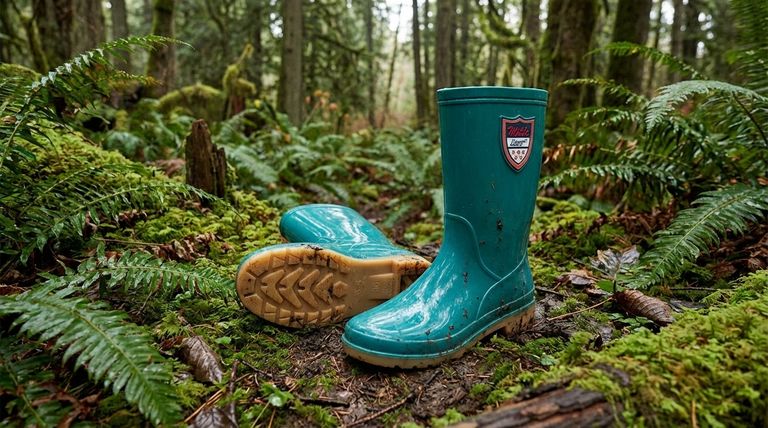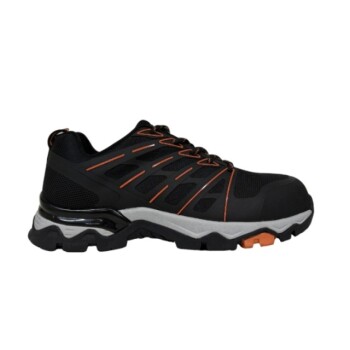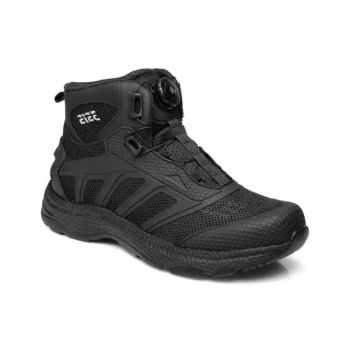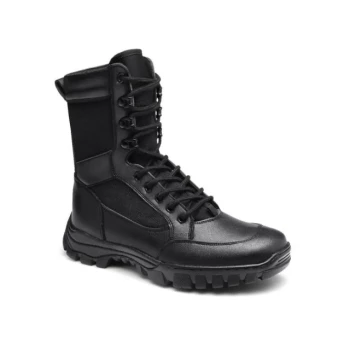The most sustainable alternatives to traditional wellies are those made from natural rubber, recycled materials, or offered by brands committed to circularity through take-back and recycling programs. These options move away from the environmental issues associated with virgin, petroleum-based plastics like PVC that dominate the conventional market.
True sustainability in a wellington boot isn't just about the material it's made from. It involves considering the entire lifecycle of the product—from how the raw materials are sourced to what happens to the boot at the end of its useful life.

The Problem with Traditional Wellies
Most conventional wellies are produced from Polyvinyl Chloride (PVC), a type of plastic derived from fossil fuels. This material presents several environmental and health challenges.
Dependence on Fossil Fuels
The production of virgin PVC is an energy-intensive process that relies on non-renewable petroleum resources, contributing to carbon emissions.
Harmful Additives
To make rigid PVC flexible and suitable for footwear, plasticizers like phthalates are often added. These chemicals can leach out over time and have been linked to health concerns.
End-of-Life Issues
PVC is not biodegradable and is notoriously difficult to recycle, especially when mixed with other materials in a consumer product. Most old wellies end up in landfills, where they persist for centuries.
Key Sustainable Materials to Look For
Choosing a better boot starts with understanding the materials. Several alternatives offer a significant improvement over virgin PVC.
Natural Rubber: The Gold Standard
Natural rubber is a renewable resource tapped from the Hevea brasiliensis tree. It is prized for its natural elasticity, durability, and waterproof properties.
Critically, it is also biodegradable, meaning it can break down and return to the environment at the end of its life, unlike synthetic plastics.
Certified Sourcing for Natural Rubber
To ensure the rubber is sourced responsibly, look for certifications like the Forest Stewardship Council (FSC) or the Fair Rubber Association. These guarantee that the forests are managed sustainably and that workers are treated ethically.
Recycled Materials: Giving Waste a Second Life
Some brands now construct boots from recycled PVC or other post-consumer plastics. This approach diverts waste from landfills and reduces the demand for virgin fossil fuels.
While a positive step, it's important to remember that the boot itself may not be easily recyclable a second time.
Beyond Materials: What Defines a Sustainable Brand?
The material is only part of the story. A truly sustainable brand demonstrates a deeper commitment through its business practices.
Circularity and Take-Back Programs
Leading brands are embracing circular fashion, a model designed to eliminate waste. They may offer repair services or, more importantly, a take-back program that allows you to return worn-out boots for them to be recycled into new products.
Supply Chain Transparency
Sustainable companies are transparent about where and how their products are made. They can provide information about their factories, labor standards, and raw material sourcing.
Durability as a Core Feature
The most sustainable product is often the one you don't have to replace. A high-quality, durable boot that lasts for years will always have a lower environmental impact than a poorly made "eco-friendly" boot that quickly wears out.
Understanding the Trade-offs
No choice is perfect, and it's essential to understand the nuances when selecting a sustainable product.
Natural Rubber vs. Recycled PVC
Natural rubber is superior from a renewable and biodegradable standpoint, but its production must be managed responsibly to prevent deforestation. Recycled PVC is excellent for tackling existing plastic waste but remains a synthetic material that doesn't biodegrade.
Cost and Performance
Boots made from high-quality, certified natural rubber often come at a higher price point due to the costs of sustainable harvesting and ethical labor. However, this initial investment typically pays off in superior comfort, flexibility, and longevity.
Making the Right Choice for Your Needs
Your final decision should align with your personal priorities.
- If your primary focus is biodegradability and performance: Choose a boot made from high-content natural rubber, ideally with an FSC or Fair Rubber certification.
- If your primary focus is minimizing plastic waste: Look for brands that use a high percentage of recycled materials and have a clear end-of-life recycling program.
- If your primary focus is long-term value and accountability: Prioritize a durable, well-made boot from a brand that offers repairs, transparent sourcing, and a take-back scheme.
Ultimately, choosing a sustainable wellington boot is a powerful way to vote for a healthier planet with your wallet.
Summary Table:
| Sustainable Alternative | Key Feature | Best For |
|---|---|---|
| Natural Rubber | Renewable, biodegradable, durable | Biodegradability & performance |
| Recycled PVC/Plastics | Diverts waste, reduces virgin plastic use | Minimizing plastic waste |
| Circular Brands | Take-back programs, repairs, transparency | Long-term value & accountability |
Ready to step into sustainable footwear? As a large-scale manufacturer, 3515 produces a comprehensive range of eco-friendly footwear for distributors, brand owners, and bulk clients. Our production capabilities encompass all types of sustainable shoes and boots, including options made from natural rubber and recycled materials. Let us help you meet the growing demand for responsible products. Contact us today to discuss your sustainable footwear needs!
Visual Guide

Related Products
- Factory Direct Wholesale Rain Boots Durable Waterproof & Fully Customizable
- Factory-Direct Wholesale Canvas Boots with High-Traction Rubber Soles
- Wholesale Safety Footwear Manufacturer for Bulk & Custom OEM Orders
- Premium Grain Leather Safety Boots for Bulk Supply
- Premium High-Cut Waterproof Safety Boots Manufacturing & Wholesale Solutions
People Also Ask
- What certifications should you look for when purchasing sustainable Wellington boots? Choose GRS and FSC for verified eco-friendly footwear.
- What are the main benefits of PVC boots? Unmatched Waterproof & Chemical Protection
- What are the main materials used in the production of rain boots? A Guide to Durability & Comfort
- What are the recommended sustainable materials for Wellington boots? Choose Natural Rubber for Eco-Friendly Performance
- What factors determine the carbon footprint of Wellington boots? Material, Durability, and Your Environmental Impact
- How long do Wellington boots typically last with proper care? Maximize Your Boot's Lifespan
- Are Wellington boots suitable for snowy conditions? Choose the Right Winter Wellies for Safety & Warmth
- How can rubber boots be categorized in terms of quality? From Basic to Best-in-Class



















